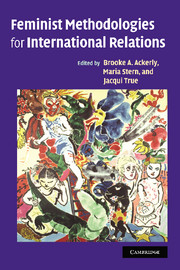Book contents
- Frontmatter
- Contents
- Notes on the contributors
- Acknowledgments
- 1 Feminist methodologies for International Relations
- Part I Methodological conversations between feminist and non-feminist IR
- 2 Feminism meets International Relations: some methodological issues
- 3 Distracted reflections on the production, narration, and refusal of feminist knowledge in International Relations
- 4 Inclusion and understanding: a collective methodology for feminist International Relations
- Part II Methods for feminist International Relations
- Part III Methodologies for feminist International Relations
- Conclusion
- Bibliography
- Index
4 - Inclusion and understanding: a collective methodology for feminist International Relations
Published online by Cambridge University Press: 12 January 2010
- Frontmatter
- Contents
- Notes on the contributors
- Acknowledgments
- 1 Feminist methodologies for International Relations
- Part I Methodological conversations between feminist and non-feminist IR
- 2 Feminism meets International Relations: some methodological issues
- 3 Distracted reflections on the production, narration, and refusal of feminist knowledge in International Relations
- 4 Inclusion and understanding: a collective methodology for feminist International Relations
- Part II Methods for feminist International Relations
- Part III Methodologies for feminist International Relations
- Conclusion
- Bibliography
- Index
Summary
Mainstream scholars of international relations seem unwilling to incorporate the burgeoning body of feminist work into their analyses (Tickner 1997, 2001; Keohane 1997; Sylvester 1996b; Whitworth 1997; Locher and Prügl 2001). Some feminists have responded to this lack of attention with calls for inclusion (Enloe 1996; Tickner 1997; 2001; Whitworth 1997; Locher and Prügl 2001; Committee on Status of Women in the Profession [hereafter Committee] 2001). Such calls are based on the argument that the marginalization of feminist work is unjust, stemming as it does from the subordination of women in society and in the field itself (Zalewski and Parpart 1998; Enloe 1993; Tickner 1997; 2001; Sylvester 1996b). In addition, feminist scholarship offers substantive insight, improving our understanding of gender inequality and prompting revision of key concepts in mainstream IR (e.g. Tickner 2001; Enloe 1996; Sylvester 1996b; Committee 2001). However, feminist scholars have been hesitant to argue that mainstream scholars who attend to feminist work will have a better, more objective view of international relations than those who do not. This hesitation is mainly due to concerns that making such arguments requires invoking a positivist epistemological stance or an essentialist conceptualization of women (Tickner 2001: 13; Enloe 1996: 186, 200).
In this chapter, I aim to show that these concerns are unwarranted. I argue that greater attention to feminist work on the part of mainstream scholars will result in a better, less partial view of international relations.
- Type
- Chapter
- Information
- Feminist Methodologies for International Relations , pp. 62 - 88Publisher: Cambridge University PressPrint publication year: 2006
- 10
- Cited by



